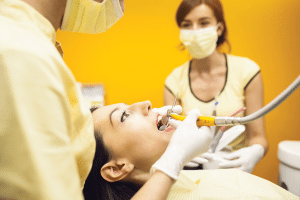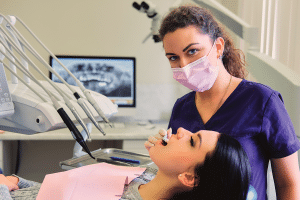W2 or 1099? Why It Matters to Dental Professionals_UPDATED
By Fazel Mostashari, MBT, CPA/FPS- 1/14/2020
This editorial is an update to our prior article written and emailed in 2018. The original will be attached at the end of this article. This is edited and written to apply to Dentists and other medical professionals.
Around September 2019, California Assembly Bill 5 reversed The “ABC” Test including exemptions for certain professionals such as dentists (and doctors, psychologists, insurance agents, stockbrokers, lawyers, engineers, and real estate agents). Please see below link to read the AB5.
https://leginfo.legislature.ca.gov/faces/billNavClient.xhtml?bill_id=201920200AB5
This was an amendment to the 2018 ruling by the Supreme Court of California in Dynamex Operations West Inc. vs. Superior Court of Los Angeles (The three-part test also known as the “ABC” test determined whether an employee could be classified as an independent contractor instead of as an employee. The 2018 ruling replaced a previous 11-point “Borello” test, set in 1989).
Even after this reversal and change we do continue to advise our clients to use the more conservative approach when hiring associates. Please see my prior article for clarification below.
Now assisting our clients filing their 1099 for their contractors and also representing them for their Worker’s Comp audits, we address this issue again to prevent from potential liability. Please see below analysis for the distinction between Independent Contractor and Employees and how it applied to dental professionals. Please consult your own attorney and CPA to review your specific operations.
As many of you are aware, the classification of an employee (EE) vs an independent contractor (IC) has become an issue to discuss and reevaluate in the dental industry, after recent court decision (California Supreme Court affirming lower court’s ruling) that made the distinction a bit more inflexible introducing the ABC test.
—-(Dynamex Operations West v. The Superior Court of Los Angeles County). To read the court case please see this link: http://www.courts.ca.gov/opinions/documents/S222732.PDF
It is also to be noted, that the plaintiffs in the case were no dental professionals. It dealt with delivery drivers incorrectly classified as ICs. It should also be a point to consider how this ruling should apply and could be compared to work of dental professionals with advanced skills and specializations. It will take some time to see how IRS, EDD, FTB, DOL or any other interested agency will apply these rules specifically to dental professionals and also how and when and if it will be challenged in courts. From the legal stand point, the ABC test broadens definition of employee in independent contractor analysis. From the practical and daily use questions remain that need to be cleared specifically for dental professionals and specifically specialists working for multiple offices.
—-Also CDA provided two updates in recent months in this regards: Please see these two links that discuss the issue and how it relates to dental industry. A description of the ABC test is included as well.
https://www.cda.org/news-events/employee-or-independent-contractor
—-Another blog in this regard discussing this issue is the following article:
http://www.thedentistsnetwork.net/newsletters/print/Oromchian/printOromchian307.html
At my wife’s dental office we employ a general dentist and a periodontist that both perform specialty services. Also many of our friends that are either specialists, 1099 GPs or own a dental practice are concerned about the ramifications of this new ruling of the dental industry in California.
I think there is no need to describe the meaning, consequences and duties of IC or EE since most professionals are well aware of it or can simply google it. The issue that I researched was how this should be applied to daily dental office operations and if the current practices will be affected.
In general most specialists such as Endodontists, Pediatricians, Periodontists, OSs that perform their services at various offices are paid based on production and receive 1099s, and are classified as IC. Some GPs that also work for many employers receive their compensations via a 1099 and are considered an IC. Some specialists working for larger corporations receive W2s and are EEs.
All DAs, RDAs, TCs, Office Manager and other staff must be paid as W2s since there is no room for any doubt. Also GPs that exclusively work for one employer on a continuous basis must be paid W2.
The question is how to treat super GPs working at many offices and perform specialty services and also how to classify specialists that also work for more than one employer.
1. This could impose undue burden for some professionals as some might receive multiple W2.
2. How should W2 specialist deduct ordinary and necessary expenses as some incur substantial supply and staff expenses? Schedule C? Schedule A, Line 21? Or complete a corporation tax return with expenses only? How will depreciation work?
3. How will one contribute to retirement plans? What will happen with 7.65% deduction for AGI (deduction for self-employment tax on Line 57 of Form 1040) on their personal tax returns?
4. How will specialists be compensated under the new circumstances? (e.g employment taxes, malpractice insurance, workers comp, sick and vacation leave).
If you are a Specialist /IC, I recommend to contact a Dental CPA or a Dental Attorney (or better both) to review your specific circumstances. Also a conversation with your employers should follow thereafter.
After the reading the case and above sources I undertook following additional efforts to add to my research.
- I called TDIC Risk Management Unit. Their advice was “Call Employment Attorney”, and provided me with two phone numbers.
- I called CDA Practice Support. Their response in short was the following:
- Run tests base on your own relationship to Dentist- EACH OFFICE has to run its own test.
- Is the professional an exempt person making more than $43,680? = Could be IC
- Is the professional longer than 1 year in your office = should be W2
- Brings his own tools, supplies and staff : IC
- I also spoke to a dental and employment attorney that emphasized the importance of a thorough analysis and suggested to treat specialist as nonexempt and W2 if in doubt.
Some Conclusions:
- There is no clear and unanimous industry rule for these special cases. It seems, it will be a case by case analysis and decision with majority of employers leaning toward W2 model to limit potential liability.
- Each office should run its own tests how the relationship should be structured. Some guidance is provided on the CDA link above. I also copy and pasted some sections below. Also see this link for some more items you can incorporate into your test.
https://quickbooks.intuit.com/r/1099-w2-employee-calculator/.
- Each employer should documents steps taken to show due diligence in case EDD, IRS or any other agency is opening an audit. Also seek additional advice from your attorney and CPA. Document as much possible to show your due diligence and reasonable steps taken in order to satisfy additional legal requirements in case of an audit.
(COPY AND PASTE FROM CDA POST ON 6/13/2018 & 3/27/2018).
As of May 1, workers in California can now only be considered independent contractors if the employer can establish that all of the following factors are true:
A. The worker is free from control and direction over performance of the work, both under the contract and in fact.
B. The work provided is outside the usual course of the business for which the work is performed.
C. The worker is customarily engaged in an independently established trade, occupation or business (hence the ABC standard).
Factor B in the ABC test essentially means that any professional performing dentistry in a dental practice most likely should not be considered an independent contractor. This applies to specialists and hygienists as well. Therefore, the workers who may be classified as independent contractors under this new decision are, but are not limited to, janitors, electricians and billing and human resources professionals, as these are professionals who are not performing dentistry.
Before classifying an employee, employers should consider the following factors: (From CDA).
- The individual takes instructions from you or a manager regarding when, where and how work is completed.
- The individual receives training from your practice, is required to attend meetings and is expected to abide by practice policies.
- The practice is somewhat dependent on the type of service provided by the individual.
- The individual must personally perform the contracted services.
- The practice supplies support staff (DA, RDA) to assist the individual.
- The individual provides ongoing services to the practice.
- The practice determines the individual’s work hours.
- The expected duration of the relationship is long term.
- The individual performs the work on practice premises.
- The practice provides equipment, tools or other supplies to the individual.
- The practice has the right to discharge the individual.
- The individual may terminate his or her services at any time without penalty.
This post is for general info only. Please consult your own CPA or attorney how this affects your business and specific circumstances.




